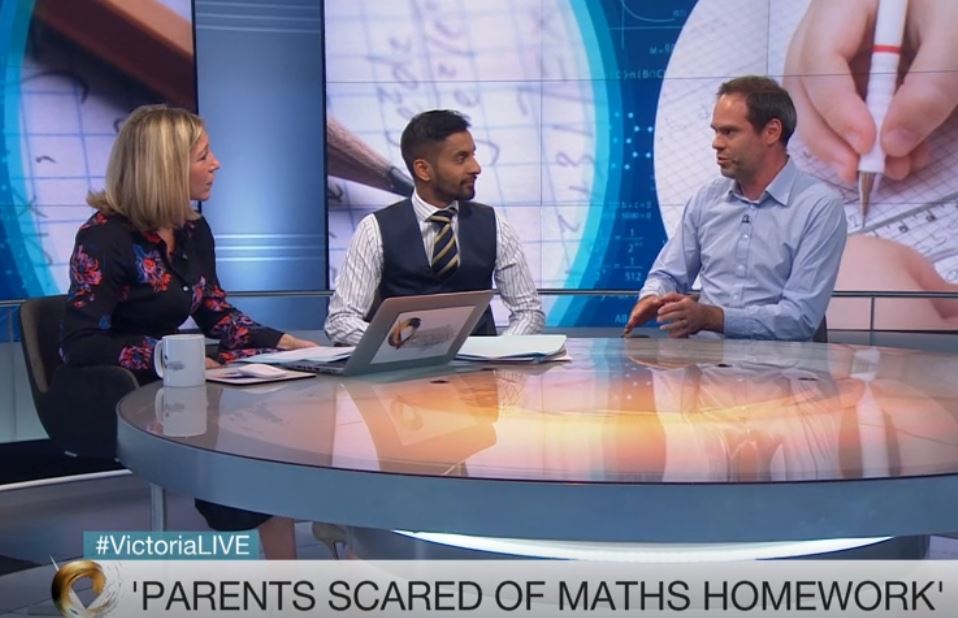I did something a little out of the ordinary the other day. While taking part in a live television broadcast discussing maths homework, I admitted one of my greatest regrets.

Many people say you shouldn’t have regrets. That idea makes me uncomfortable because we all make mistakes. A failure to have regrets is surely a failure to acknowledge your mistakes?
The regret I so publicly admitted to making on the Victoria Derbyshire show? When I sat my GCSEs, I only obtained an E grade in mathematics.
My failure to obtain a higher grade when I was at school has left me feeling wanting. Indeed, a few years ago I hinted that I was seriously thinking about re-training as a teacher.
There are a few reasons why I haven’t pursued this plan. One of the biggest is that you are expected to have GCSE mathematics at grades 9-4 (A-C using the old grading system). With that rectified, I could then straighten out the other stumbling blocks in my path.
Although I think it unlikely I will eventually retrain as a teacher (my thinking and logic have changed somewhat), I am sorely tempted to pay to sit that GCSE privately. Not having that basic qualification has been an open would for many years.
I can’t pretend otherwise, I scraped through A-Levels, spent several years in dead end jobs before returning to college as a mature student and retraining as a journalist. I have always been more of a writer than a mathematician, but as I’ve got older I’ve developed a love of engineering, architecture and design and I’ve embraced technology.
All these things have been created by people who understand mathematics and can apply it. By default, I have developed an appreciation of mathematics. I may never be able to do mathematics as well as someone with a degree in the subject but, wow, do I respect those that do.
For a moment I have to deviate here. I must take some of the blame for the fact I got such a poor grade in my maths GCSE. I was a bit of a lost soul as a teenager and didn’t apply myself at school as I should have done.
The way we sat the exams, however, was ridiculous. We were streamed at school. Although I was generally placed in higher-ability streams, when it came to mathematics I was placed in a lower ability group.
I have no complaints about this, it probably was a reasonable reflection of my abilities at that time. The stream you were in, however, governed which GCSE mathematics exam you sat and the highest grade you could obtain.
I have no idea who came up with such a bizarre way of testing kids’ abilities, but if you were in one of the top streams, you sat a paper where you could get grades A, B or C. If you were in a middle stream, you could obtain grade C, D or E. The paper my peers and I sat was limited so the highest grade we could get was grade E.
Any equality of opportunity was stripped from the system entirely. Being a lanky teenager with no confidence I simply accepted the status quo and went along with it.
As a father with kids in the school system, I consider this scandalous and absolutely no way would I tolerate this for my own children. I’d rather pay to have them tutored and sit the exams privately.
Rant over, let’s get back to mathematics and why I made this confession to thousands of TV viewers. It was all to do with mathematics homework.
The Open University Business School has published research that shows 20% of parents avoid doing maths homework with their kid because they struggle with it. A staggering 29% say they struggle helping their six to nine-year-old kids while 28% of parents admitted that once their kids were at secondary school it was game over, the homework was too advanced for them to help.
The focus of the research, however, was on day-to-day finances. A worrying 52% of mums and dads said they wouldn’t be able to help their kids find the best mortgage deal and 52% would struggle to help their offspring find the best electricity or gas deal.
I appeared on the show to talk about my experiences of helping my kids with their maths homework. With Izzy, my five-year-old, I don’t have any problems. At this stage she’s generally doing simple multiplication and subtraction. When it comes to helping Helen, however, I do sometimes have issues.
Despite my poor GCSE grade, I am not too bad at maths (I have got grade C GCSE accountancy, so I can’t be totally innumerate). When I do help Helen, I frequently get the answers correct. My methodology, however, is utterly foreign to her because teaching methods have changed and in my opinion, improved massively since I was at school.
On the show with me to discuss the Open Univerity’s research was maths teacher and University Challenge supremo Bobby Seagull. He was such an engaging character I can imagine him captivating a room full of teenagers and explaining the most complicated theories (He’s also worked on a money management course with the Open University that you can find out about here).
Seagull himself conceded that teaching methods had changed. Perhaps schools need to introduce maths lessons for parents so they can truly grasp what is being taught in the classroom and help their children at home? I think that would be a great idea and I believe some schools have introduced such lessons.
I’ll finish by repeating something else I said during that TV appearance. Based on my experience as someone who didn’t get a good grade maths GCSE grade, I pleaded with kids to pay attention in class and to study hard. I also implored parents to do all they could to help their kids with their maths homework.
Oh, yeah, just for the record, I also got grade E home economics. This, however, has not proven to be such a big issue during my adult life.






